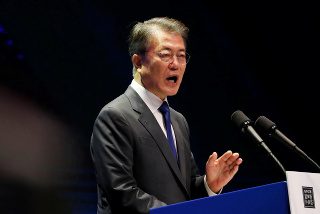South Korean President Moon’s Pardon: No “Prisoners of Conscience” Were Included in the Special Pardon
Official Statement About the Special Pardon on December 29, 2017

No prisoners of conscience were included in the Special Pardon.
On December 29, 2017, President Moon Jae-in granted a special pardon in his first year in office. Since he left out the chance on the National Liberation Day and Chuseok, we looked forward to his first amnesty. However, we cannot believe the result even if we get to the contents. He is the president who didn’t release a single prisoner of conscience. So, why did he drag on until the last working day of 2017?
President Moon did not keep the victims of the former government warm.
The Minister of Justice took credit saying this special pardon was designed from the very start to help those convicted of crimes while trying to make a living. But it is not different from the previous disappointing government. This special pardon ignored all prisoners of conscience including Lee Seok-ki and Han Sang-gyun as well as the victims associated with the Sewol Ferry Tragedy and THAAD.
The conscience of the government stopped in front of prisoners of conscience.
A related official of the Blue House said,
“There was a concern that the special pardon would lead to national division.”
It sounds like a cowardly excuse. The government would rather say that it was afraid that the approval rating or votes in the local election in 2018 would fall. As the poet Song Kyung-dong said,
“Is the government of Moon Jae-in afraid of Park Geun-hye and Lee Jae-yong in prison?”
President Moon Jae-in must know that human rights issues should be decided by a majority decision.
However, the fact that he dealt with all results through electronic approval during his vacation comes to our attention.
December 29, 2017, will be recorded in history as the day when the conscience of the government which was established as a result of the people’s Candlelight Movement [and the impeachment of president Park] betrayed both the prisoners of conscience [including those imprisoned by President Park] as well as the Candlelight Movement.

